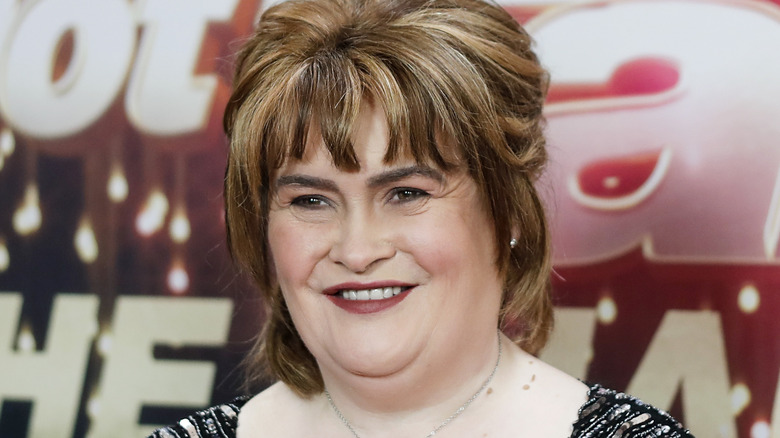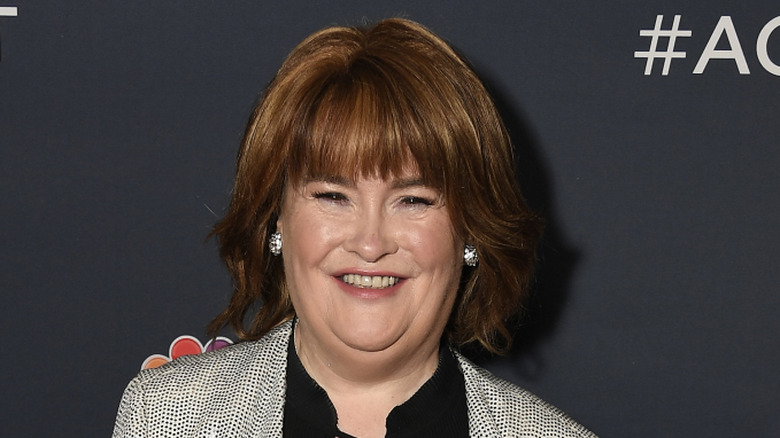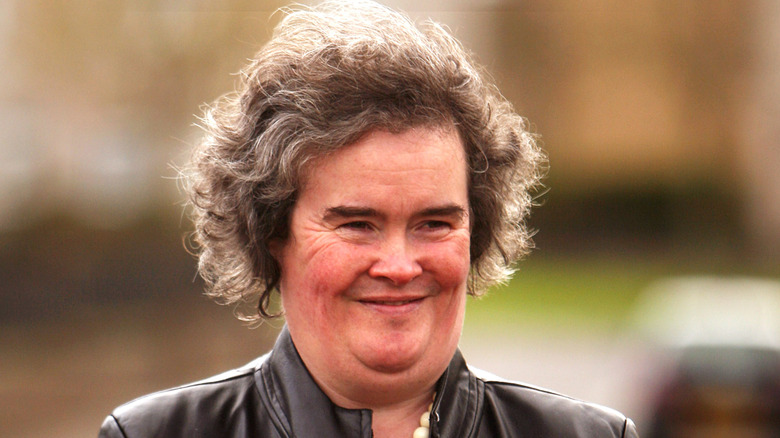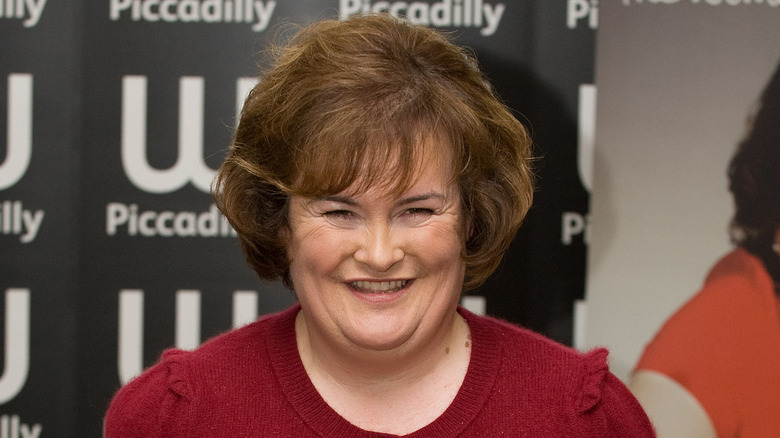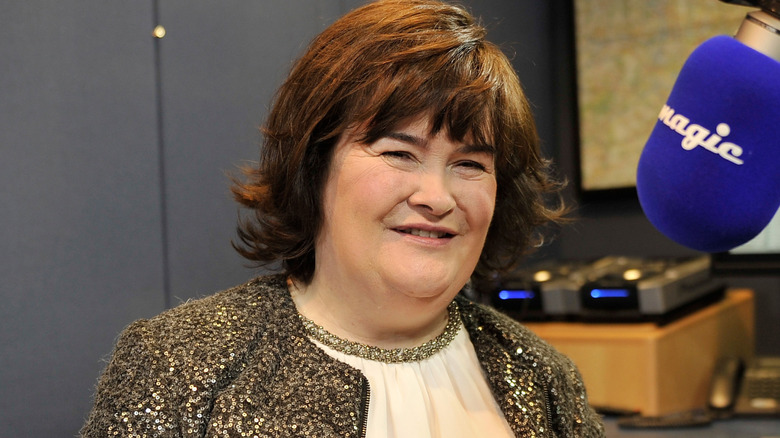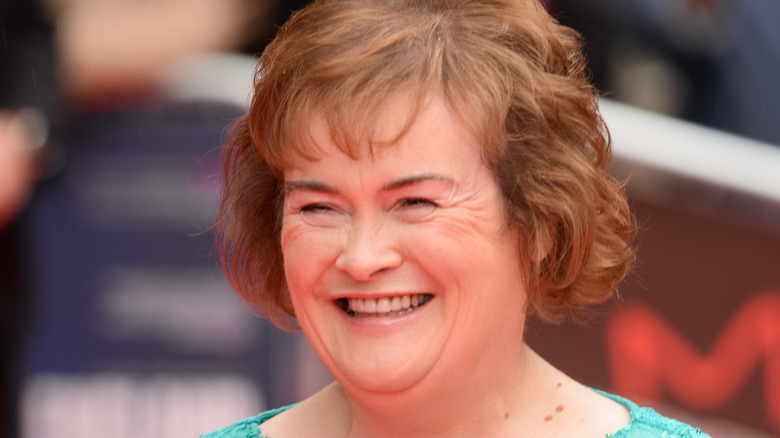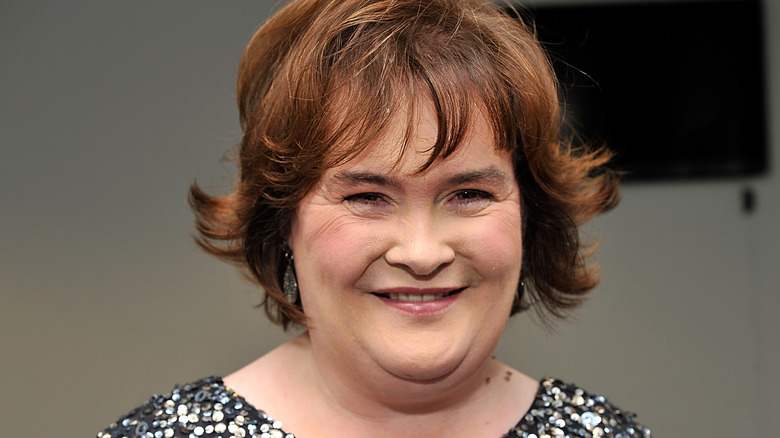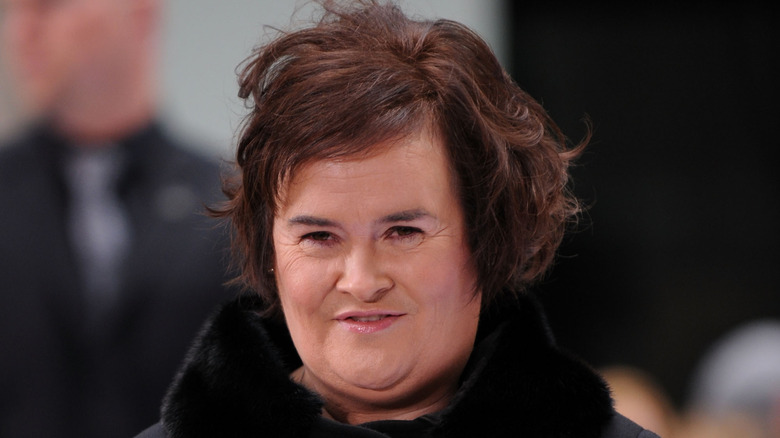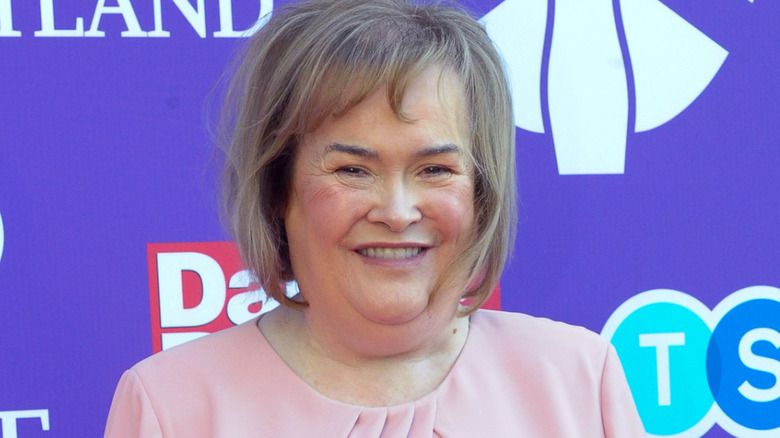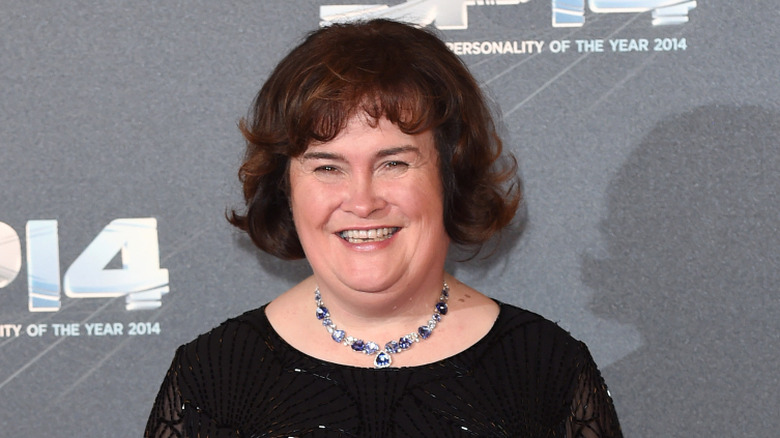The Tragedy Of Susan Boyle Explained
Susan Boyle became an instant star and an overnight success around the world when she appeared on a U.K. reality show in 2009. A publicly unknown church volunteer from Scotland, Boyle was 47 years old when she walked onto the stage of "Britain's Got Talent" and turned in a masterful and devastating performance of "I Dreamed a Dream" from the historically accurate "Les Miserables." Not only did it bring down the house and visibly move the show's judges, it made Boyle into an international musical sensation. Her operatic, superb voice has since driven sales of tens of millions of copies, particularly in Boyle's native U.K. and in the U.S., too.
But Boyle's enduring popularity is as much about her story as it is about her talent. Her run on "Britain's Got Talent" is one peak moment in a long journey to fame and recognition, both a happy ending and a new beginning for a late-blooming, non-traditional star. Boyle's path may resemble a storybook or a movie, but her life has been a tough one. The singer has been beset by hardship and loss in the decades leading up to "Britain's Got Talent" as well as after, and throughout her time as a beloved musician, she has experienced the deaths of loved ones, medical issues, trauma, and cruelty. Here's a look at the tragic side of the remarkable life of Susan Boyle.
Her neurodivergence was misdiagnosed until adulthood
Susan Boyle's health issues weren't clearly identified until she was well into adulthood, though they began before birth. Bridget Boyle was 45 when she became pregnant with her ninth child in 1960; the risk of maternal death was so high that doctors advised termination. Bridget, staunchly religious, carried the child to term. Complications developed during the pregnancy, and Bridget was diagnosed with preeclampsia, a variety of high blood pressure that can immediately threaten the life of an unborn child. "We both nearly died, and she was told I'd suffered brain damage as a result of being starved of oxygen at birth," Susan told The Guardian. The singer grew up believing that her medically chaotic birth was the source of her learning issues.
In 2012, when Susan was in her 50s, she sought out a specialist to get a more accurate picture. "It was the wrong diagnosis when I was a kid," she told The Guardian. Susan found an explanation for her bouts of depression and mood shifts and her difficulty with social situations: She placed on the autism spectrum. "I thought I had a more serious illness and couldn't function properly," she said. "Now I have a clearer understanding of what's wrong, and I feel relieved and a bit more relaxed about myself."
Susan Boyle was bullied at school
Throughout her childhood in Scotland in the 1960s, Susan Boyle dealt with frequent and cruel bullying from her classmates. As a child, Boyle was diagnosed with epilepsy, a neurological issue that was often poorly understood at the time. "They called me touchy. At school I used to faint a lot," Boyle told The Daily Mail Weekend (via MedIndia). That earned some torment, as did the idea that Boyle was significantly less intelligent than her peers. Classmates gave her a nickname of a derisive, racist nature as well as one that targeted her learning disabilities and perceived lack of intelligence. "At school, I felt very frustrated, very lonely — people didn't want to sit next to me in class. I was often bawling my eyes out and it does tend to chip away at your personality," Boyle told The Daily Mail.
In 2011, Boyle took some of her newfound fortune and bought a five-bedroom house, but six years later she moved back into her family's home where she'd always lived. A return to her hometown brought with it new bullies. "They have been shouting at me, taunting, saying vile things, swearing," she told The Daily Mail of local teenagers who surround and intimidate her when she goes out on walks, sometimes even throwing rocks and paper strips they've lit on fire.
She was abused as a child
Raised in Blackburn, Scotland, in the 1960s and 1970s, Susan Boyle was the youngest child of Bridget and Patrick Boyle. Boyle's father had some problems with anger and acted out with violence, and it was his daughter who bore the brunt of his outbursts while she was young. It took years for Susan to process the experience. "My father, though a very good man, had a temper," Susan told The Daily Mail. "He showed it to me and he hurt me. He didn't mean to, but I held on to this for years and when he was dying, I had to let it go." Relatives believed that Patrick Boyle developed his tendencies toward violence and abuse after having fought for the U.K. in World War II.
Patrick Boyle also prevented Susan from pursuing a romantic life. At the age of 25, she was in a relationship with a man until her father ended it on her behalf. "My dad didn't like him. He said he wasn't right for me," Susan told The Daily Mail. "I was in love with him, but he made someone else pregnant soon after. My dad decided that particular boy was not for me and I was too immature to handle a relationship."
Susan Boyle was mocked and harrassed on TV
Susan Boyle's triumphant, historic performance on "Britain's Got Talent" in 2009 wasn't the first time the singer tried to use reality television to boost her musical career. More than a decade before that successful attempt, she auditioned for another televised talent show, where she was summarily mocked by the host in front of a large crowd — one of many disturbing things that happened on a reality show.
English comedian and presenter Michael Barrymore hosted a short-lived show in 1995 called "My Kind of People," where he visited towns in Britain and invited locals to show off their talents. When the roadshow came to Olympia Shopping Centre in East Kilbride, Scotland, Boyle tried twice to land a spot on the show. During one of them, while Boyle tried to sing "I Don't Know How to Love Him" from "Jesus Christ Superstar" in front of spectators and other hopefuls, she endured Barrymore lobbing jokes at her expense as she did. At one point, he got on the ground and tried to peer underneath Boyle's skirt. She lightly kicked him, and he kissed her. And after all that, Boyle wasn't selected to perform on TV.
She experienced a lot of loss
In the late 1990s, Susan Boyle experienced successive personal setbacks, one in her romantic life and the other a profound loss that reshaped her existence. During her first slot on "Britain's Got Talent," Boyle described herself as having "never been married, never been kissed" (via The Telegraph), but she'd later admit that the latter statement wasn't entirely true, as she'd been in relationships before. "I had a boyfriend, John, who worked in an office," Boyle told The Daily Mail. "He asked me to marry him after seven weeks, although we'd only ever had a peck on the cheek." John subsequently broke off the engagement, and the relationship ended. "It made me sad, in a way. It makes you feel unattractive, you feel that life is passing you by."
Boyle's father, Patrick Boyle, was diagnosed with multiple serious health problems in his advanced age, including respiratory issues, a form of cancer, and Alzheimer's disease. He died in 1999 (other reports say 1997) at the age of 83. "There was no change in my family until then," Boyle recalled, attributing the death to "old age." "At a time like that you can either be strong or go to pieces. I'd lost a father, but my mother had lost a lifelong partner."
Her mother's death led Susan Boyle to quit singing
Susan Boyle was raised as part of a large family in Scotland. Her eight older siblings eventually all moved out, but Boyle didn't, and after the death of her father in the late 1990s, the future star stayed behind to care for her aged mother. For about eight years, Boyle served as her mother's live-in, primary caregiver.
When her mother, Bridget, died in 2007 at age 91, Boyle grew despondent. In the immediate aftermath of the death, she refused to leave her house for several days at a time and wouldn't answer the phone or allow visitors. Her mother's encouragement and death would inspire Boyle's next steps. "I felt a part of me had died with her and I was also in danger of losing our family home because I wasn't working. I was totally lost, but then I remembered how she always told me to follow what makes me happy," she told The Guardian.
Boyle's 2009 audition for "Britain's Got Talent," the show that made her a phenomenon, was the first time she'd sung in public since her mother died. "I was left really upset because of the bereavement I had and decided to give up singing," Boyle told The Times. "Up until then I was singing in the church choir and doing karaoke regularly, but I just didn't feel up to it after that."
Susan Boyle was hospitalized for mental health issues
Despite being probably the most famous act to ever emerge from any iteration of the "Got Talent" franchise, Scottish singer Susan Boyle didn't win her season of "Britain's Got Talent" — she came in second to a dance troupe called Diversity. Immediately after the grueling, weeks-long televised contest came to an end in May 2009, Boyle voluntarily checked into the Priory, a mental health treatment facility in London. She officially sought help to deal with exhaustion but underwent an evaluation following reports that her behavior and mood had drastically changed after intense and invasive media scrutiny. It was such a sensitive matter that the U.K.'s Press Complaints Commission asked local news outlets to refrain from sharing any details of Boyle's health crisis, at the urging of Boyle's management.
"Everything had built up and I was exhausted. You have to understand, my life ceased to be normal when 'Britain's Got Talent' went live. There were a lot of press people outside my door, a lot of television people, a lot of people who wanted a piece of me," Boyle explained of the ordeal to The Daily Mail. "I had to draw my blinds, and even after that they started hammering on my door. I didn't have any security then — it was just me and one of the 'BGT' production team, who had been sent up to stay nearby for me. I was quite frightened."
Susan Boyle had a stroke
In early March 2020, Susan Boyle played a rigorous mini-tour of eight concerts in 11 days at major theaters in Scotland, Wales, and England. Those would mark Boyle's last concerts for years, and she didn't record an album during the early 2020s either. In June 2023, Boyle returned to public life with an encore performance of "I Dreamed a Dream" on "Britain's Got Talent" — re-creating the combination of song and show that made her a star in 2009 — and shared why she hadn't been seen in so long, and why the performance was so important to her. "It feels great. It is extra special for me, actually, because last April there, I suffered a minor stroke," she said on the show (via NBC Insider). "I have fought like crazy to get back on stage. And I have done it."
After the show, Boyle gave more details about the stroke and her lengthy, 15-month recovery to regain some of her temporarily lost abilities. "For the past year I have worked so hard to get my speech and singing back, with the sole aim of being able to sing on stage again," she wrote on her Instagram page.
She was a hacking victim
Susan Boyle comports herself with a certain level of dignity and reserve, and she prefers to sing show tunes and standards (including one of the best covers of Leonard Cohen's "Hallelujah") to an appreciative audience with conservative taste. That's why it was so shocking, and potentially embarrassing, when an internet provocateur took aim at the singer by uploading some incongruously edgy material to the singer's Spotify channel.
In September 2023, Boyle's fans and followers on the music streaming giant noticed that the bestselling singer had apparently uploaded her first new recording in several years. That song, as presented across album art of pink leopard print, was called "A*** Queen." After the incident started to trend on social media, Spotify quickly removed the song and dismissed it as a hoax — it wasn't a real Boyle song.
It's believed that the title choice referred to a Boyle PR disaster from years earlier. In 2012, Boyle's promotions team tried to get social media attention for the release of the singer's "Standing Ovation: The Greatest Songs from the Stage" with a virtual listening event it promoted with the hashtag #susanalbumparty. All those words on their own are innocent, but jumbled together and read differently they inadvertently formed a dirty joke, leading to a thorough roasting of the singer and her team on Twitter (now known as X).
If you or someone you know may be the victim of child abuse or needs help with mental health, contact the relevant resources below:
- Contact the Childhelp National Child Abuse Hotline at 1-800-4-A-Child (1-800-422-4453) or contact their live chat services.
- Contact the Crisis Text Line by texting HOME to 741741, call the National Alliance on Mental Illness helpline at 1-800-950-NAMI (6264), or visit the National Institute of Mental Health website.
